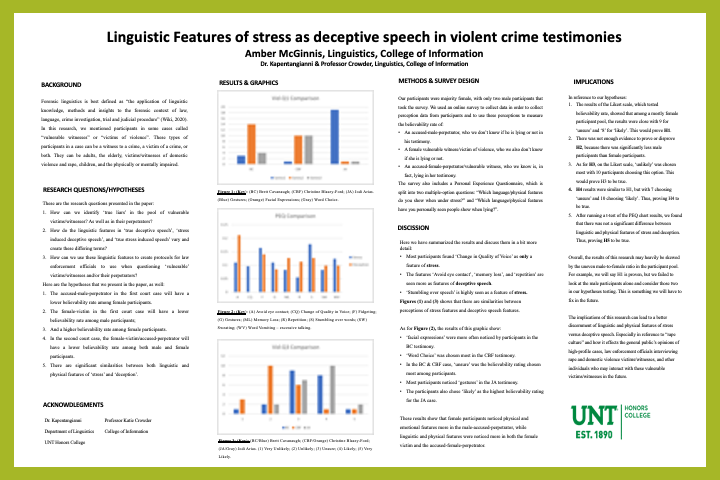First Name:
AmberLast Name:
McGinnisMentor:
Dr. Konstantia KapetangianniAbstract:
In this study, we examine linguistic and physical features caused by stress that can be interpreted as deceptive speech, such as gestures, saccadic eye movement, lexical choice, and phonological features which may look like stuttering, repetition, and silence. We will specifically be looking at deceptive speech in ‘vulnerable witnesses’ or ‘victims of violence’, defined as children, rape victims, domestic violence victims, the elderly, and the physically impaired, and how these linguistic and physical features affect the believability rate of their testimonies. In “Victimization, Fear of Crime, and Perceived Risk: Testing a Vulnerability Model of Personal Control” (Shippee, 2012), they describe a Vulnerability Model to help define these vulnerable witnesses/victims of violence. We will conduct an online questionnaire using participants to survey testimonies of those involved or witnesses to a violent crime and use their responses to measure the believability rate of those involved in the cases. Survey questions will ask the participants to rate the individuals in each video on a scale of ‘very unlikely’ to ‘very likely’ lying. There will also be a Personal Experience Questionnaire, which will provide information on the participants perceptions of their own stress and perceptions of other people’s deceptive speech indicators. We will be using video testimony of recent, high-profile cases involving rape and murder such as the Jodi Arias case and the Brett Cavanaugh case, in which the participants will watch short clips of and answer questions that will gather their perceptions of lying in each case. We will use qualitative data analysis to examine the connections between stress and deceptive speech in vulnerable witnesses/victims of violence and perpetrators of violence by noting the use of these linguistic and physical features. It is expected to show that the believability rate will be heavily affected by the gender, race and age of the participants surveying the testimonies. The results of our research can lead to designing protocols for law enforcement to detect true deceptive speech when handling vulnerable witnesses by looking at their linguistic features.Poster:





